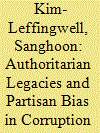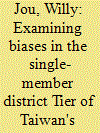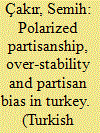| Srl | Item |
| 1 |
ID:
191965


|
|
|
|
|
| Summary/Abstract |
What explains the lack of electoral consequences for corrupt politicians? Building on studies of motivated reasoning and asymmetric partisan bias, this article highlights the importance of partisan differences in how voters interpret corruption convictions and make voting decisions. I contend that in post-authoritarian democracies, supporters of authoritarian legacy parties (ALPs) are less likely to punish corrupt copartisan incumbents compared to supporters of other parties faced with equally corrupt copartisan incumbents. While voters of all kinds appear likely to ignore corruption among copartisan incumbents, supporters of authoritarian legacy parties are particularly likely to do so. Using original datasets from South Korea, this study shows empirical evidence of the lack of corruption voting for ALP partisans across three legislative elections. This article further finds partisan discrepancies and a striking lack of corruption voting among authoritarian legacy partisans.
|
|
|
|
|
|
|
|
|
|
|
|
|
|
|
|
| 2 |
ID:
126580


|
|
|
|
|
| Publication |
2013.
|
| Summary/Abstract |
Who do citizens blame for the recent European economic crisis? In this paper, we test theories about blame attribution with respect to the economic crisis. We argue that blame for the crisis is partially conditioned by partisan bias and framings of the crisis as being related to globalization. We test the argument with new survey data and a survey experiment from Spain. In the experiment, respondents receive different framings of the economic crisis which are endorsed by different political parties and non-partisan organizations. We obtain the following findings: (i) blame for who is responsible for the economic crisis is greatly affected by partisanship; (ii) making globalization as a cause of the crisis salient exonerates the government of blame, but only for co-partisans of the government; and (iii) citizens are willing to blame other globalization-related factors for the crisis, in particular, European governments and blame the domestic government less. The results expand our understanding of public opinion dynamics during major economic recessions and also suggest conditions under which "scapegoating" globalization can occur.
|
|
|
|
|
|
|
|
|
|
|
|
|
|
|
|
| 3 |
ID:
126130


|
|
|
|
|
| Publication |
2013.
|
| Summary/Abstract |
Two elections to the Legislative Yuan have been held under a mixed parallel system. While there have been criticisms that this new set of rules leads to a considerable disparity between parties' vote and seat shares in the district tier, in so far as the new electoral system has been accepted and therefore treated as given by both parties and voters, its fairness should be assessed not by the degree of proportionality, but rather by examining various sources of potential bias. These include differences in electorate sizes and turnout rates across districts, and the efficiency by which votes for the main parties' candidates are distributed. The present study investigates how "fair" the functioning of Taiwan s new mixed parallel system was in the 2008 and 2012 legislative elections by simulating equal and reverse vote scenarios at the district level, and measuring the magnitude of each component of electoral bias. The results show that the operation of the electoral system entails no marked partisan bias, since it does not consistently confer an advantage to either of the main parties or camps.
|
|
|
|
|
|
|
|
|
|
|
|
|
|
|
|
| 4 |
ID:
173196


|
|
|
|
|
| Summary/Abstract |
A vast literature demonstrates that partisanship has a stabilizing impact on politics, as it limits electoral volatility. Recent studies have also shown that polarization increases partisanship, thus contributing to electoral stability. Focusing on Turkey, an unconsolidated and highly polarized democracy, this study investigates the role of partisanship in a comparative context by means of data from the Comparative Study of Electoral Systems project. I find that Turkey (among more than 40 countries) is a very high-partisanship country, where partisanship greatly shapes the evaluations of short-term determinants of vote and the vote itself. This research also shows that partisanship in Turkey is associated with very low electoral volatility and defection rates. Moreover, the degree of identification also plays a significant role in its impact on volatility and defection. These findings from the Turkish case offer insights and stimulate a new normative debate on the role of partisanship in unconsolidated democracies.
|
|
|
|
|
|
|
|
|
|
|
|
|
|
|
|